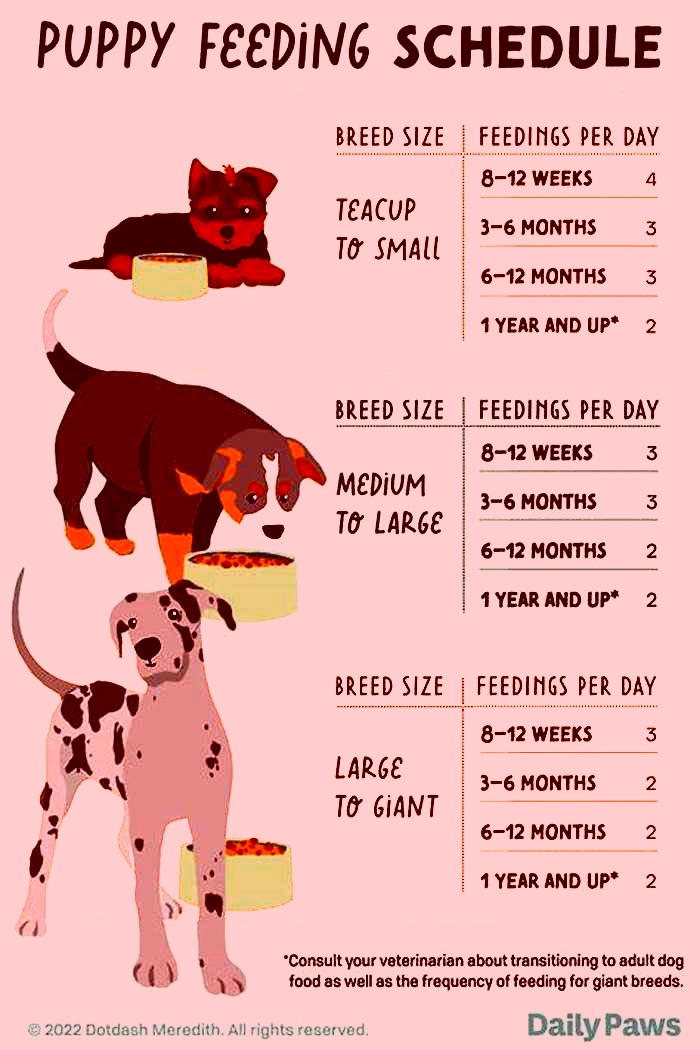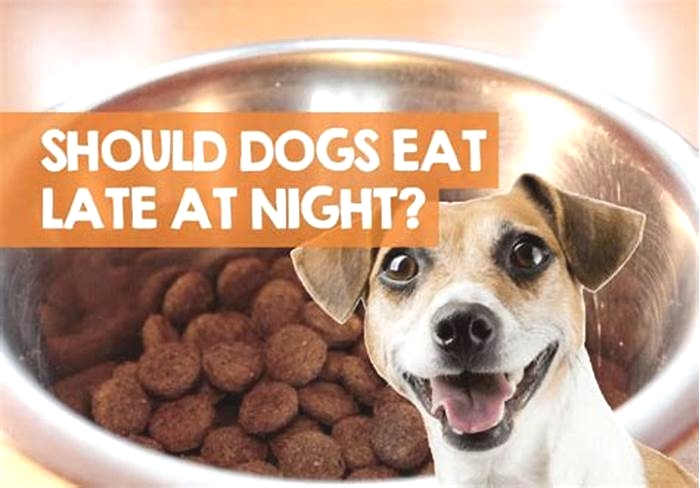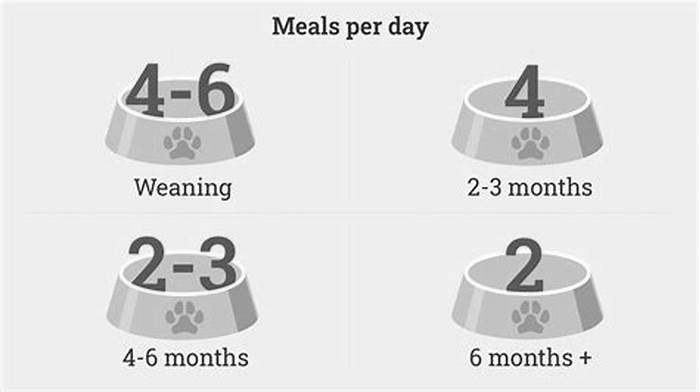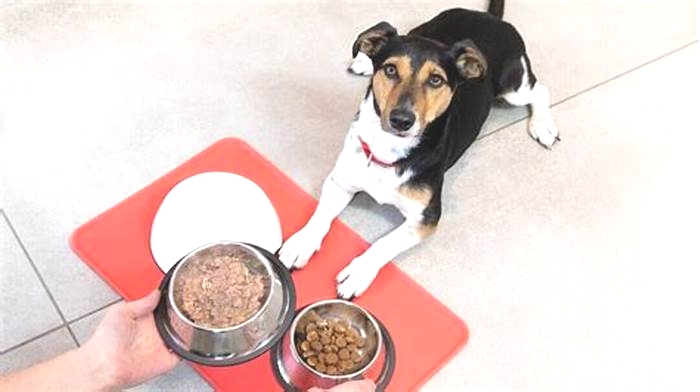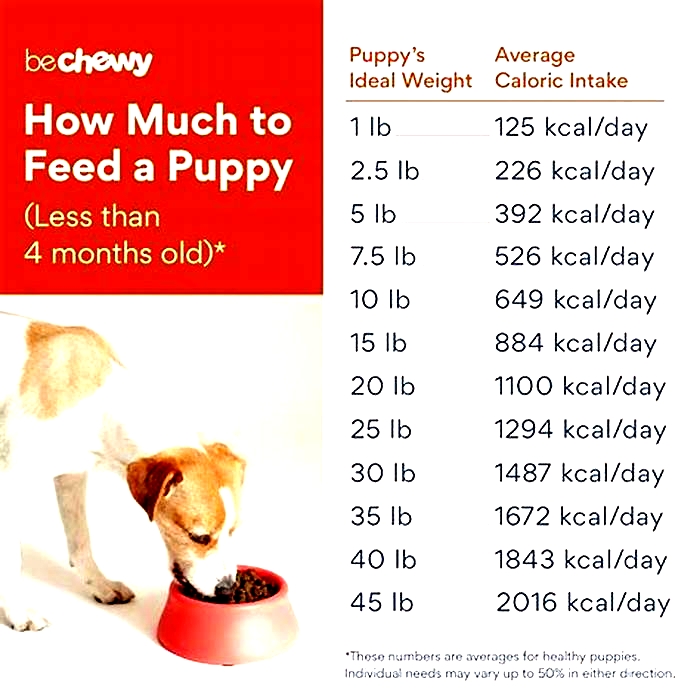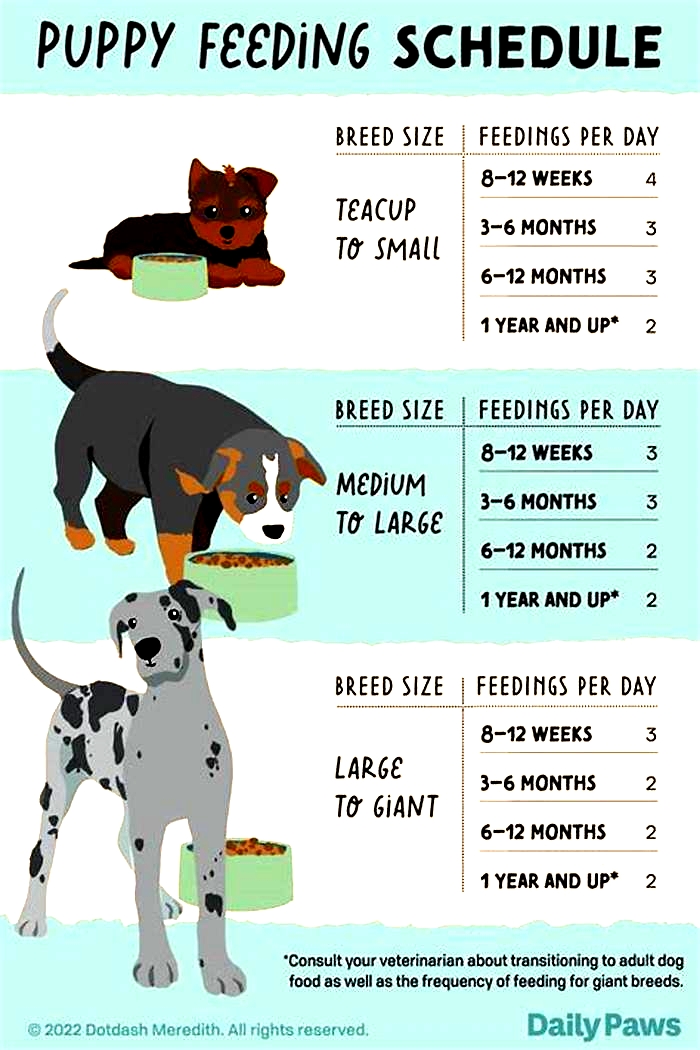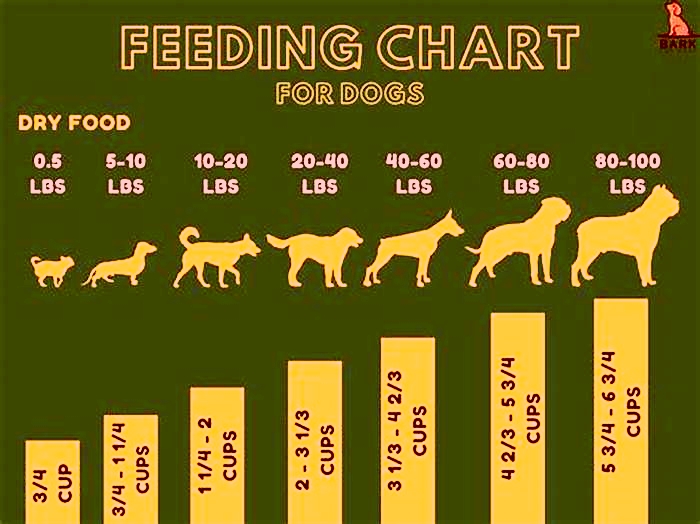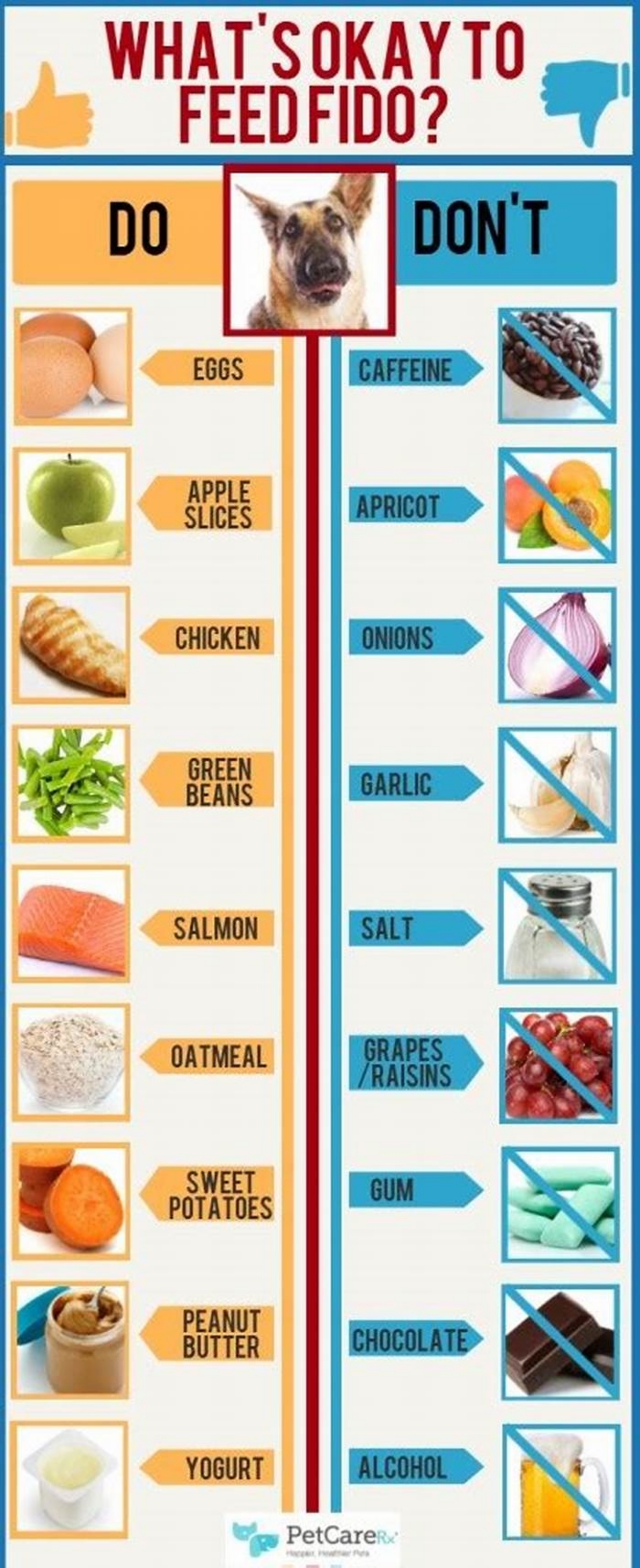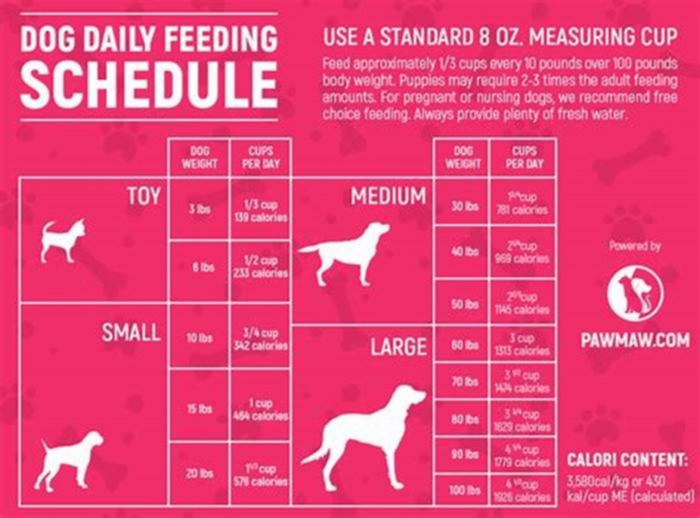Is 9pm too late to feed my dog
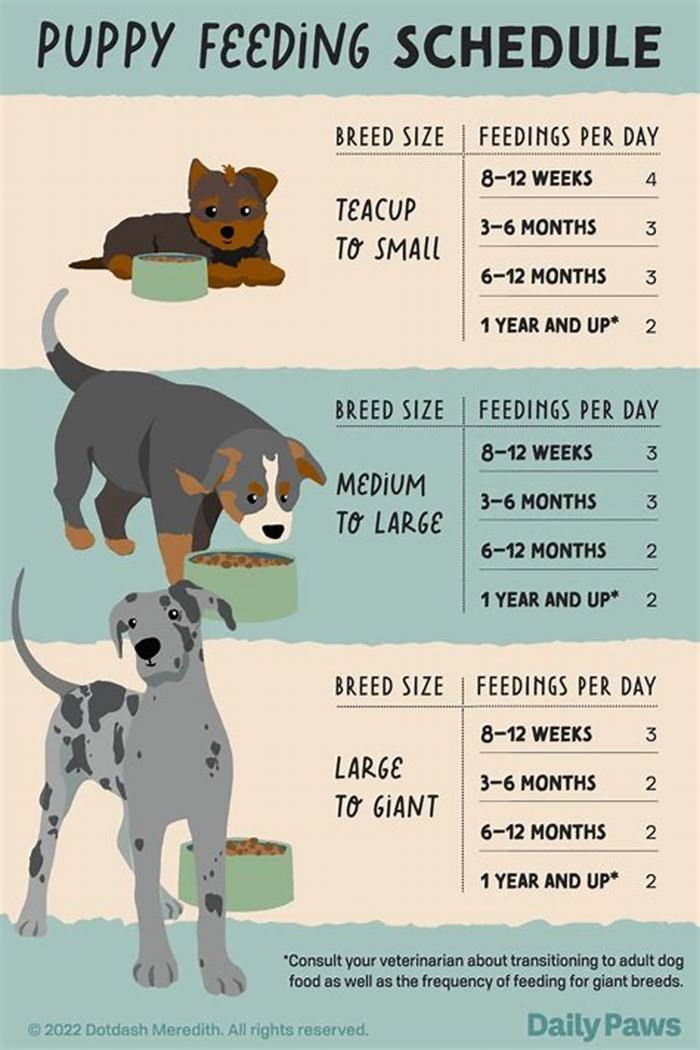
What Is the Best Time to Feed Your Dog?
Most dog owners pattern their pets feeding schedule after their own mealtimes. For instance, if the pet owner has breakfast at 7 in the morning, then the pet should have its chow, too. But is it appropriate to apply human mealtimes to our dogs? If not, then what is the best time to feed our canine friends?
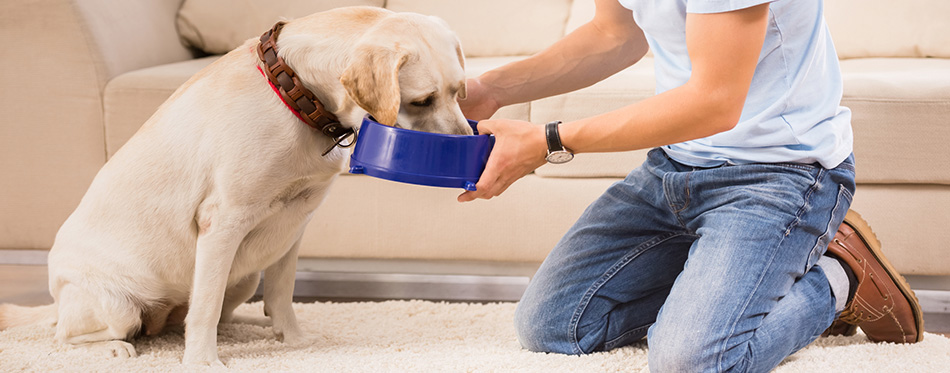
Common Feeding Times for Dogs
Different pet parents observe different feeding schedules for their respective dogs. Some observe a twice-daily feeding schedule while others go for once-a-day feeding. There are also those that leave the feeding to their dogs, meaning it is free choice. Let us look at these feeding times one by one.
Twice-a-Day Feeding
Pet parents who observe a twice-daily feeding schedule will feed their dogs once in the morning and another in the evening. They often observe an 8- to 12-hour period in between meals. For instance, if you give your dog its breakfast at 7 in the morning, you can give its dinner at around 3 in the afternoon or 7 in the evening. This is typical for healthy adult dogs and follows the normal canine digestion.
The dogs digestive system requires about 5 to 6 hours for it to process and absorb the food that it consumed. These nutrients will still be present in the dogs blood for a few more hours before its stomach starts sending hunger signals to the brain. This occurs about 8 to 10 hours after the meal, depending on the amount of calories that the pet consumed in its last meal.
As early as 8 hours after its last meal, the dogs brain receives the first hunger signals. These grow in intensity and can manifest in different dog behaviors telling you they are already hungry.
The timing of their first meal depends on a few considerations. One of these is their need to defecate. Canine fecal elimination occurs anywhere between 30 minutes to 1 hour after a meal. If you are going to work at 8 in the morning, this means you need to feed them at about 6:30 AM. This will give you ample time to take them out for a walk for them to defecate. You can then prepare for your work.
You can also observe the same consideration during their second and last meal of the day. You may want to feed them first before you walk them for a poop. The current recommendation is to make their evening walk longer so that they will also tire afterwards. This will help them go to sleep a lot faster. The timing, then, depends on what time you want to be on your own bed.
This twice-a-day feeding schedule is applicable to normal healthy adult dogs. Younger dogs such as puppies often require more frequent feedings. The same is true for dogs with certain health conditions.
Related Post: Automatic Dog Feeders
Once-a-Day Feeding
Proponents of once-a-day dog feeding schedule often feed their dogs in the evening. They will feed their dog upon coming home from work. After about 30 minutes or so, they can take their hound out for a long 30- to 60-minute walk.
There are also those who feed their dogs early in the morning, before they tend to their other life commitments. Again, the general guideline here is to feed the dog first before you facilitate their defecation.
Once-a-day feeding is not recommended among dogs that are prone to gastric dilatation volvulus. These include breeds like Great Danes, Weimaraners, St. Bernards, and Doberman Pinschers, among others. Veterinarians consider once-a-day feeding to be a major risk factor in the development of this life-threatening condition. In GDV, the dogs stomach expands and twists on its own axis. This can lead to the cutting off of the blood supply to the organs of the abdomen.
If you are considering feeding your dog only once a day, make sure that it doesnt have a deep and narrow chest. These dogs are more prone to GDV than any other breed.
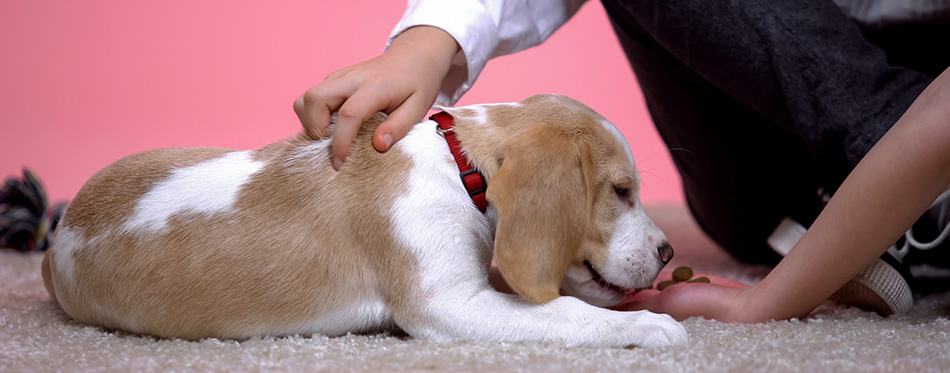
Feeding Ad Libitum or Free Choice
There are also pet parents who feed their dogs ad libitum. This means its up to the dog to decide when it wants to eat. This approach is ideal for hyperactive dogs that may require frequent trips to their food bowl to replenish their energy. It may also work for nursing dams since they have plenty of small mouths to feed.
It is also the ideal solution for pet parents who may have difficulty adhering to a strict dog feeding schedule. All they need to do is to leave their pets with a bowl full of dog food and they can go on their merry way.
For this to work, the dog food should be in the form of kibbles. It is never a good idea to use canned or wet dog food in an ad libitum feeding approach. Dog kibbles take longer to spoil so your dog can still feast on its food at the end of the day.
The main issue with feeding your dog ad libitum is that it can increase the risk of health problems like GDV and obesity. Some dogs can finish a days supply of dog food in one sitting. This can make them develop bloat, a major precursor of GDV. If they dont watch the amount of food they are taking, dogs can also become overweight. This is because some dogs have a knack for eating beyond satiety.
There can also be issues about the dogs behavior. It may not want to share the food with the other dogs in the household.
Feeding Schedules for Other Dogs
The preceding section talks about the feeding schedule for a normal, healthy adult dog. However, there are certain dogs that may not do well with these feeding schedules. Let us look at them.
Puppies
When deciding on the mealtimes of puppies, it is important to consider its toilet training. This is almost the same with the elimination pattern of adult dogs. Potty-training puppies often entails taking them outside the house several times each day. Some puppies may have to go outside about 5 to 6 times every day. As such, you can intersperse your feeding schedule within these housetraining sessions.
Sleep is another factor in puppies that you should consider. Puppies can sleep from 16 to 20 hours every day. You will want to schedule their feeding time during the puppys waking hours.
The last factor that you need to consider is the puppys activity levels. In general, pups spend their energy in bursts rather than in a sustained manner. This means you can see them playing now and sleeping a few minutes later. This is because they have already used up their energy.
The current recommendation is to feed puppies at least 3 times a day. Younger puppies require more frequent feedings than their older counterparts.
For example, you can take them outside for a short walk right after waking up. After an hour, you can give it its first meal of the day. After 30 minutes, you can then take it out to defecate in the backyard. You can give its 2nd meal at noontime or after about 4 to 6 hours from its first meal. You can take it out again for the 3rd time. Give it its 3rd and last meal for the day at around 6 or 7 in the evening before taking it out for a walk. For more options head over to our guide on puppy food.
Senior Dogs
When feeding senior dogs, you can adhere to a once or twice a day feeding schedule. However, there is one very crucial piece of modification you have to observe. It is important to reduce the amount of dog food they consume per meal. This is because their digestive system is no longer as efficient as when they were still at their prime. Their activity level is also lower than adult dogs.
Senior dogs may also come with health conditions that require a modification of their nutrition. It is best to adhere to your vets recommended feeding schedule if you have a sick senior dog. For more options, check out our detailed review of the best dog food for senior dogs.
Active Dogs
There are dogs that lead very active lifestyles. On the average, they spend less time sleeping and more time working or engaging in physical activities. Border Collies, Vizslas, and Terriers are examples of very active dog breeds.
For these dogs, it is better to feed them three times a day. That is one in the morning, one shortly after noon, and another one in the evening. Their higher metabolic rate means they will use up their energy stores a lot faster than other dogs.
Related Post: High Protein Dog Food
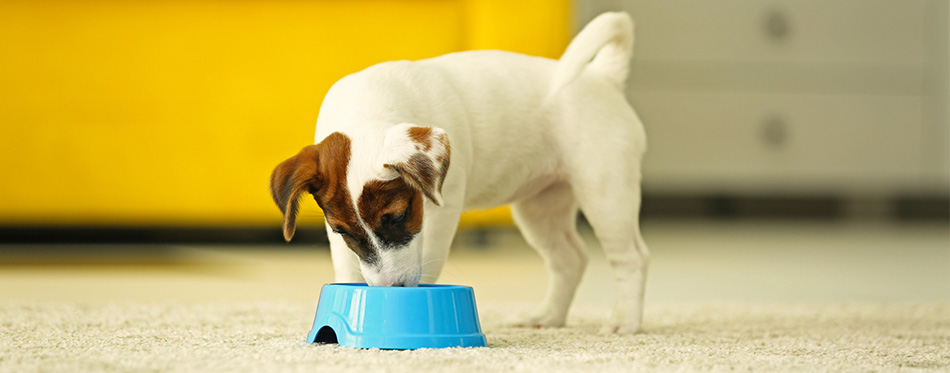
Sedentary Dogs
The opposite of active dogs, breeds that spend more time on the couch or dog bed often have slow metabolic rate. This means they dont use up their energy stores as fast as other dogs. If you feed these dogs more frequently, they may become overweight.
As a rule, sedentary dogs can feed only once a day. This should be enough to supply them with the energy that is enough to sustain their vital activities.
Figuring out the best time to feed your pet dog requires your understanding of its unique needs as well as activity levels.
Source:
- How Often Should Dogs Eat? AKC
At what time is it too late to feed?
JulitzaPosted : 8/18/2006 9:48:08 AM
How do you guys manage to have the energy to do a 12am walk???
Lol Im usually in bed by 10, and Im dog tired in the morining, but then again I am anemic [&:]
Lizzie doesnt get walks because we lived in such a populated main road with no sidewalks [
]
BUT as soon as we move into our new house (in a month) I will be taking her out for for morning and evening walks, and romps in the baseball field thats down the street!! Yay, Im SO excited, I can barely wait!
I feel like a little kid [
]
Is it Bad to Feed a Dog Late at Night? (Eating Before Bed!)
Many people feed their dogs late at night. It can be for a number of reasons; forgetfulness, work commitments, or simply that you have a dog who isnt hungry before bedtime. But I dont think you should be letting your dog eat late at night, and let me explain why
Is it bad for dogs to eat late at night or before bed? Yes, it is bad to feed a dog late at night, and there is scientific evidence to suggest it could possibly lead to unhealthy weight gain. Dogs that eat before bed will also have more energy to burn and will need night-time toilet trips, which can make their owners lives trickier.
Thats the short answer, but I wanted to also share with you some interesting research that shows how the circadian timing of food intake can contribute to weight gain in animals.
Below you can find out what the circadian rhythm means, plus read more reasons on why its bad for dogs to eat before bed.
Is it bad to feed a dog before bed?
I believe there are 5 main reasons why its a bad idea to feed your dog late at night, all outlined here:
1. Your dog will possibly gain weight
Eating late at night can possibly lead to your dog putting on weight. Dont just take my word for it though; theres scientific research to back this claim up, much of which has been collated in this report quoted below:
A number of recent studies in animals linking energy regulation and the circadian clock at the molecular, physiological, and behavioral levels raise the possibility that the timing of food intake itself may play a significant role in weight gain.
Circadian rhythm is the bodys 24-hour cycle that tells you when to sleep, eat, and wake up. Its believed to be based on light and dark hours:
Circadian rhythms are physical, mental, and behavioral changes that follow a daily cycle. They respond primarily to light and darkness in an organisms environment. Sleeping at night and being awake during the day is an example of a light-related circadian rhythm. (view source)
In simple terms it means a dogs body believes daylight hours are for eating, night-time hours are for sleeping. By eating late at night, its believed the natural pattern is disrupted, possibly leading to weight gain as the dogs body wont process food in the same efficient manner it would during the day.
The studies I reference above back this claim up. One piece of research found that mice fed outside of their normal circadian rhythm gained more weight than mice fed in their body clocks normal routine.
Whilst there has been no similar study conducted on dogs, we can assume that there could be implications for canines too where late night eating becomes habitual.
2. Your dog will become tired and lethargic during the day
If you arent feeding your dog until late at night, they could be waiting a long between meals, given that most dogs eat twice a day. This means theres a long time to wait from breakfast until the meal youre giving them before bed.
As a result, your dog could be extremely tired and lethargic in the day, not having the energy to enjoy walks and play with you.
3. Your dog will have excess energy to burn in the night
When you dog eats food, all that goodness in the protein is converted to energy. Its energy that your dog would normally be able to burn off during the day when running around and going for a walk.
If your dog is being fed before bed, perhaps due to begging, all those calories are being loaded into his system with him not having his usual opportunities to use them up in play and exercise.

This is particularly true with puppies who have a lot of energy to burn already, so feeding a puppy before bedtime is asking for trouble! This is particularly true if the puppy has not had enough mental and physical stimulation during the day, meaning they will not be tired enough to sleep.
As a general rule of thumb, its not okay to feed a dog a couple of hours before bed, unless they will be getting exercise in the next couple of hours. Even then, you should really be waiting two hours before walking your dog after eating, to reduce the risk of twisted gut.
If you do feed your dog late at night, theres every chance he will be up and about during the night and wont be able to get to sleep possibly even keeping you up in the process!
If he then has a disrupted sleep, he could be really tired in the morning, and not have the same inclination to want to go for a morning walk with you if thats what your routine dictates.
4. Your dog will need toilet breaks in the night
Depending on how your home is set-up, you could have to sacrifice your own sleep if feeding your dog late at night due to them needing to poop and pee.
If they dont have a dog flap or access to an outdoor area, theres every chance they will wake you up on the night, meaning you dont the rest you need either.
5. Your dogs risk of heart disease could increase
This one is a possible leap of faith, but I found some research that said people who eat late are at a higher risk of heart disease. The reason being is that blood pressure rises and falls during the day but tends to be lower at night.
A synopsis of the research concluded that:
Research suggests that late-night meals significantly impacts your blood pressure overnight, keeping your body in high alert mode instead of going into relaxation. If your blood pressure remains at an elevated level, this increases your risk of heart disease and heart attacks. (view source)
Whilst this research relates to humans, I see no reason why it cant also serve as a warning why It could be bad for dogs to eat before bed.
How late can my dog eat at night?
My recommendation is feed your dog at least 3 hours before he goes to bed. This is as late as a dog should really be eating, as it gives them time to burn off the excess energy.
Three hours also takes you past the recommended 2 hour window for not exercising straight after a meal as I explain for these reasons.

What is the latest time you should feed a puppy?
Puppies should be eating three times a day; breakfast, lunch, and an evening meal. However, given how much energy puppies have, it makes sense to give yourself as much time as possible for toilet and play after they eat.
Based on that, I would recommend the three-hour rule again as the latest time you should feed a puppy. Then make sure you take them outside for the toilet and have some play with them indoor before bedtime.
My dog wants to eat in the middle of the night
If your dog wakes you up in the night due to hunger, it could be that youre not feeding them enough with their bedtime meal. Whilst I dont advocate feeding them too late at night, you could give them some snacks before bedtime to get them through the next 10 hours or so.
The problem with dogs that want to eat in the middle night is that they can quickly form behavioral patterns if you get up to feed them it needs to be stopped quickly before it become regularly problematic.
Why is my dog only eating at night?
Its simple; its because you are letting your dog eat in the middle of the night and have probably given in on a few occasions, meaning the habit is now normalized. To get your dog eating during normal day time hours you should:
- Develop a meal routine at set times twice a day.
- Do not feed your dog at night as it will expect it again and again.
- Give them a snack before bedtime to stave off night hunger.
Is it ok for dogs to sleep after eating?
On a similar subject, what about if your dog wants to go to sleep after eating, and can that be bad for them? Apparently not according to Care.com, it actually important to let sleeping dogs lie;
Giving a puppy some down time after a feeding helps to eliminate digestive disturbances, such as gastric bloat or torsion. If your puppy is energetic after feedings, keep the house as calm as possible. Tell the kids your puppy needs a half hour nap time.
This statement reminds me of when my son was young. Human babies always have a sleep after food so why wont dogs be the same. I know I feel like lying down on the couch after a big meal!
Handy Hint: Have you ever noticed your dog breathing quickly through their nose whilst sleeping? I published a guide explaining what this means and when to worry.
Conclusion
The bottom line is that from a physiological perspective, calories dont count for more at night. Its not like they double up! However, there is some evidence to suggest that dogs bodies dont deal with them same meaning it can be bad for dogs to eat late at night.
And not only that if you load your dog up with food before bedtime, hes going to be ramped up with energy as night falls. Plus, hes going to need to go outdoors!
Do you really want this kind of hassle on your hands and should dogs eat late at night?
Probably not.
The next time you think it might be ok to let your dog eat when its time for bed, Id probably think again or prepare yourself for a disturbed night!

